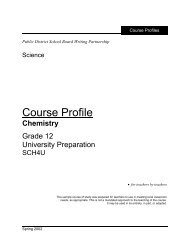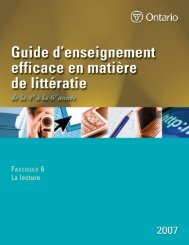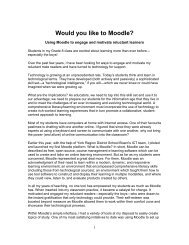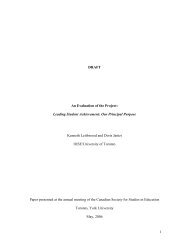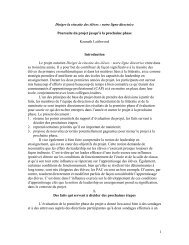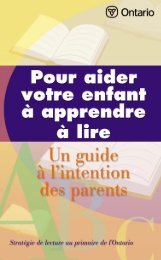a history of curriculum services canada
a history of curriculum services canada
a history of curriculum services canada
You also want an ePaper? Increase the reach of your titles
YUMPU automatically turns print PDFs into web optimized ePapers that Google loves.
In response to its request to participate in the Work Group, a motion was made to invite the<br />
Canadian Book Publishers’ Council to a future meeting. Later in May, following a meeting<br />
between Executive Directors, the Council tentatively accepted OCC's plans for a first<br />
catalogue—particularly as materials to be listed were for teacher rather than student use—but<br />
cautioned that publishers would sue boards whose resources included published materials.<br />
The Chair also reported that several meetings had taken place with the Executive Director <strong>of</strong><br />
OCSOA to discuss ongoing issues around recognition <strong>of</strong> the Catholic community. This<br />
community was pleased with OCC's undertaking to meet its needs and recommended that this<br />
would be best accomplished by printing two separate catalogues—one for public schools and<br />
one for separate schools. Continued support for the Clearinghouse project would be subject to a<br />
review <strong>of</strong> its policies and operations before the end <strong>of</strong> year one.<br />
At the same time as these issues were being addressed, another challenging situation relating to<br />
mandates and territory was developing. Extensive research, carried out in the education<br />
community to determine what OCC should be doing and what was most worth doing, showed<br />
that boards were opposed to having OCC develop learning materials. And though some <strong>of</strong> the<br />
associations were willing to consider developing materials in co-operation with the<br />
Clearinghouse, this was not a high priority for most boards and was viewed with suspicion by<br />
those that had working co-operatives and/or their own marketing mechanisms. Most boards and<br />
organizations were also unwilling to make available for free materials they had produced for<br />
sale, even though larger boards <strong>of</strong>ten provided these resources to smaller boards at little or no<br />
cost.<br />
These attitudes left OCC with limited prospects for a significant role in either <strong>curriculum</strong><br />
development or in the reproduction <strong>of</strong> materials for low-cost redistribution. Rather, the<br />
education community envisioned OCC as a "best practices" organization that could collect good<br />
materials, publicize them to educators, and perhaps play some limited role in distribution.<br />
Meanwhile, ONTERIS was continuing to collect materials for their database. This created a<br />
potential problem for OCC because, without a distinguishing role in development or distribution,<br />
OCC could well be undermined by confusion among developers over the apparent similarity<br />
between their service and that <strong>of</strong> ONTERIS. In addition, because many developers were<br />
unwilling to provide free copies <strong>of</strong> their material to more than one agency, there was the real<br />
possibility that resources could be split between the two <strong>services</strong>. Clarification was needed and<br />
a meeting was scheduled with MET, OCC, and ONTERIS. In this meeting, ONTERIS expressed<br />
a clear willingness to work with OCC and declared no intention to compete. ONTERIS’<br />
expertise lay in its technical ability; its mandate was broader than <strong>curriculum</strong> alone. The<br />
strength <strong>of</strong> OCC, on the other hand, lay in its <strong>curriculum</strong> expertise, access to clients through<br />
stakeholder groups, and ability to deal with issues such as copyright and <strong>curriculum</strong> criteria.<br />
Whether with ONTERIS or another service, a database had to be developed quickly. The Work<br />
Group had agreed that the first catalogue would be issued in January 1995 and the ability to<br />
1994<br />
©2008 Curriculum Services Canada 12



